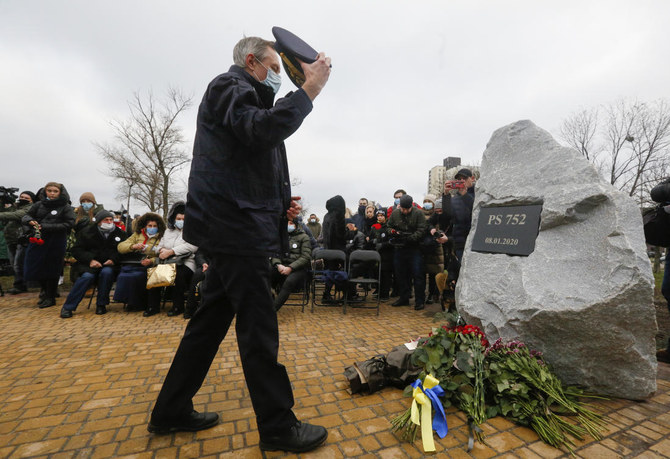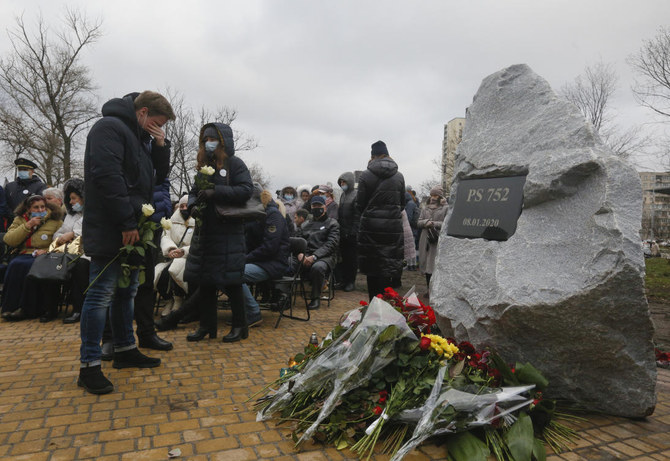LONDON: One year since two Iranian missiles shot down a Ukraine International Airlines plane, Human Rights Watch (HRW) has urged Tehran to conduct a “transparent and credible investigation” into the shooting, and criticized the crackdown on families and other Iranians seeking justice.
HRW urged Tehran to “cooperate with international bodies to uncover the truth and provide the victims’ families with justice and appropriate redress.”
Flight 752 was shot down by two Islamic Revolutionary Guard Corps (IRGC) missiles minutes after it took off from Tehran.
All 176 passengers and crew were killed, including dozens of Iranian students from the country’s top university.
“The families of the 176 victims of the downed jetliner are entitled to know who was responsible for the deaths of their loved ones,” said Michael Page, deputy Middle East director at HRW.
“The Iranian government should promptly pay adequate compensation to the families and carry out a transparent and impartial investigation with appropriate prosecutions regardless of position or rank.”
Tehran has drawn criticism from Ukraine’s government for not allowing it to participate in the investigation.
The government of Canada, whose nationals constituted the majority of the victims, has repeatedly called for Tehran to allow a multilateral investigation.
A year ago, 176 innocent people, including many Canadians, were killed when Iran shot down Flight 752. Today, we remember them and stand with those they loved. We will continue to support them and work to get them the justice they deserve. https://t.co/jl8ZEo0mf0
— Justin Trudeau (@JustinTrudeau) January 8, 2021
The British government also issued a joint statement with the Ukrainian, Canadian, Swedish and Afghan governments, all of which had citizens killed in the crash, on Friday in which they said they “urgently call on Iran to provide a complete and thorough explanation of the events and decisions that led to this appalling plane crash,” and pledged to “hold Iran to account to deliver justice.”
The five nations also said they want Iran “to deliver justice and make sure Iran makes full reparations to the families of the victims and affected countries.”
The shooting and ensuing cover up of the IRGC’s role sparked nationwide protests from Iranians demanding justice.
According to HRW, in the past year at least 20 of those protesters have faced prosecution for speaking out, but nobody has yet stood trial over the plane’s shooting.
“The authorities should immediately and unconditionally drop charges against those peacefully protesting, stop intimidating families, and direct their efforts to holding wrongdoers to account,” Page said.
According to a judiciary spokesperson, six people have been arrested in connection with the plane crash, but five of them have now been released on bail.
However, the chances of these people facing real justice are non-existent, Sadeq Saba, an editor at Persian-language newspaper Iran International, told Arab News.
“The Iranian judiciary is set up not to protect the rights of the individuals in Iran, but to protect the state,” said Saba, who worked as a lawyer in the country before the 1979 revolution.
He added that the criminalization of protesters in the wake of the missile strike is a “travesty of justice” but comes as no surprise because “Tehran normally prosecutes victims rather than perpetrators of crimes.”
Saba said since it was members of the IRGC — the most militarily and politically powerful organization in Iran — responsible for the shooting, the regime will do anything it can to protect itself and its image, including criminalizing the pursuit of justice and harassing victims’ families who seek truth and closure.
HRW said Iranian authorities have “intimidated and harassed families to stop them from seeking justice.”
This, Saba said, is because Tehran sees the families seeking justice as “enemies of the state” and a “threat,” rather than “victims who need help.” He added: “It has always been like this in the Islamic Republic.”


















